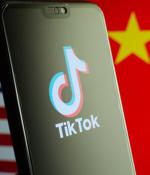Security News

The U.S. Department of Justice, along with the Federal Trade Commission, filed a lawsuit against popular video-sharing platform TikTok for "Flagrantly violating" children's privacy laws in the country. The agencies claimed the company knowingly permitted children to create TikTok accounts and to view and share short-form videos and messages with adults and others on the service.

The U.S. Department of Justice has filed a lawsuit against social media platform TikTok and its parent company, ByteDance, alleging widespread violations of children's privacy laws. [...]

Your profile can be used to present content that appears more relevant based on your possible interests, such as by adapting the order in which content is shown to you, so that it is even easier for you to find content that matches your interests. Content presented to you on this service can be based on your content personalisation profiles, which can reflect your activity on this or other services, possible interests and personal aspects.

Popular video-sharing platform TikTok has acknowledged a security issue that has been exploited by threat actors to take control of high-profile accounts on the platform. The development was first...

Over the past week, attackers have hijacked high-profile TikTok accounts belonging to multiple companies and celebrities, exploiting a zero-day vulnerability in the social media's direct messages feature. As Forbes reported today, the exploit used by the attackers to hack the accounts via DMs only needs the targets to open the malicious message and doesn't require downloading a payload or clicking embedded links.

OpenAI on Thursday disclosed that it took steps to cut off five covert influence operations (IO) originating from China, Iran, Israel, and Russia that sought to abuse its artificial intelligence...

Your profile can be used to present content that appears more relevant based on your possible interests, such as by adapting the order in which content is shown to you, so that it is even easier for you to find content that matches your interests. Content presented to you on this service can be based on your content personalisation profiles, which can reflect your activity on this or other services, possible interests and personal aspects.

Your profile can be used to present content that appears more relevant based on your possible interests, such as by adapting the order in which content is shown to you, so that it is even easier for you to find content that matches your interests. Content presented to you on this service can be based on your content personalisation profiles, which can reflect your activity on this or other services, possible interests and personal aspects.

Your profile can be used to present content that appears more relevant based on your possible interests, such as by adapting the order in which content is shown to you, so that it is even easier for you to find content that matches your interests. Content presented to you on this service can be based on your content personalisation profiles, which can reflect your activity on this or other services, possible interests and personal aspects.

Your profile can be used to present content that appears more relevant based on your possible interests, such as by adapting the order in which content is shown to you, so that it is even easier for you to find content that matches your interests. Content presented to you on this service can be based on your content personalisation profiles, which can reflect your activity on this or other services, possible interests and personal aspects.